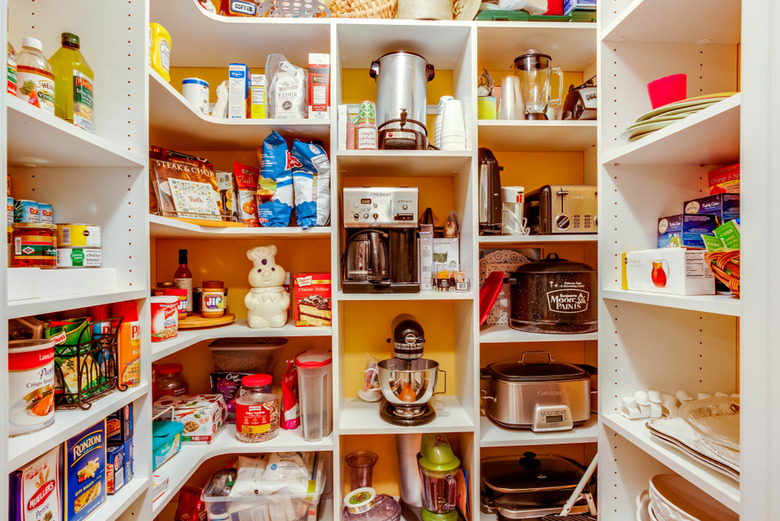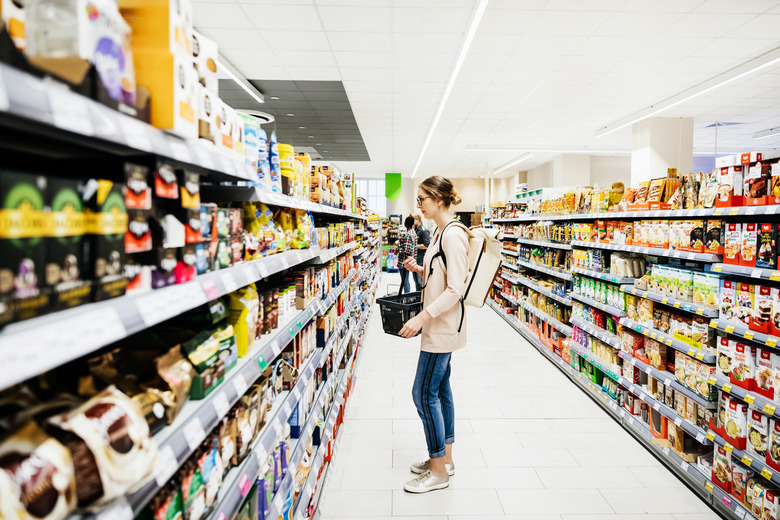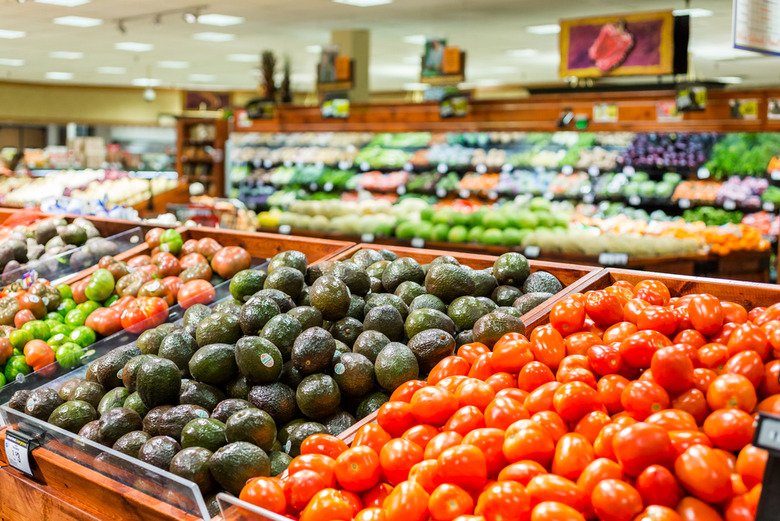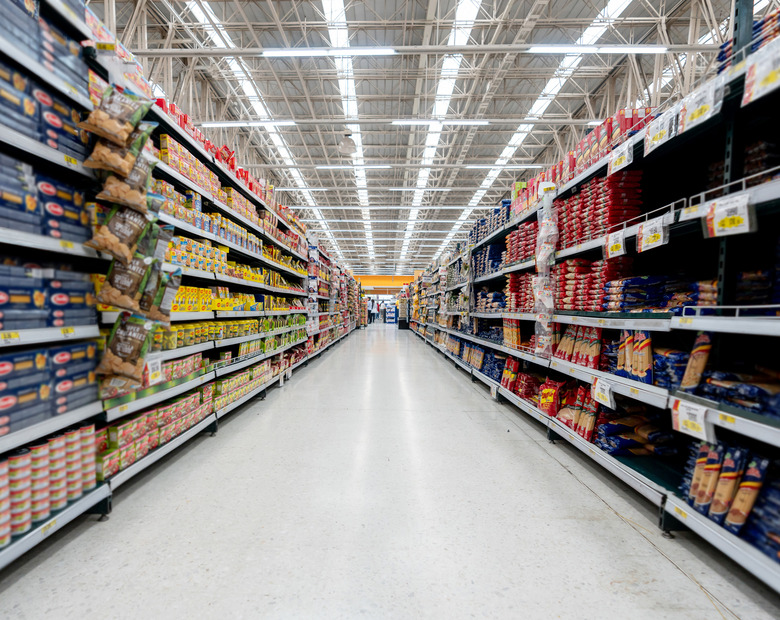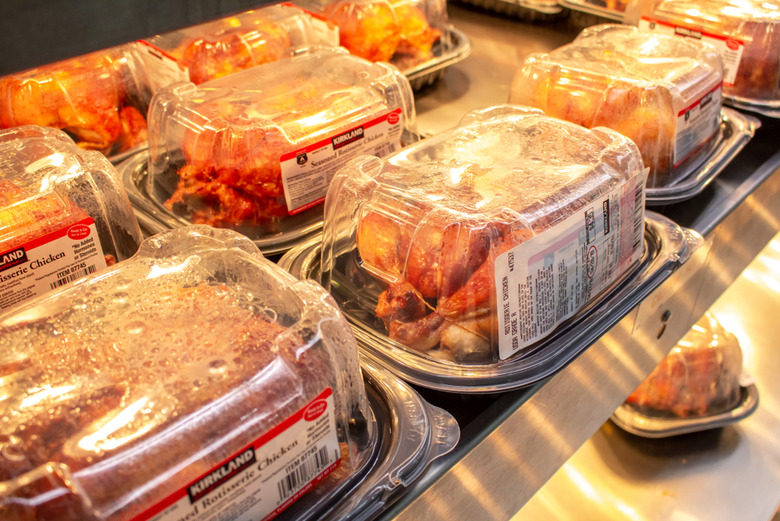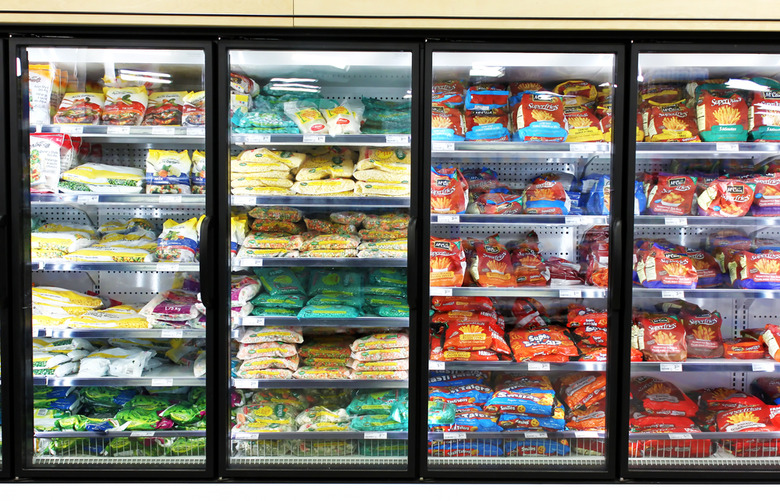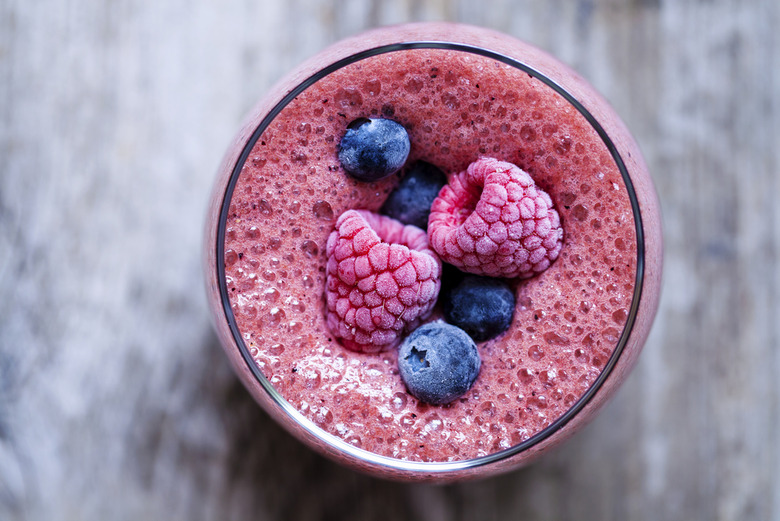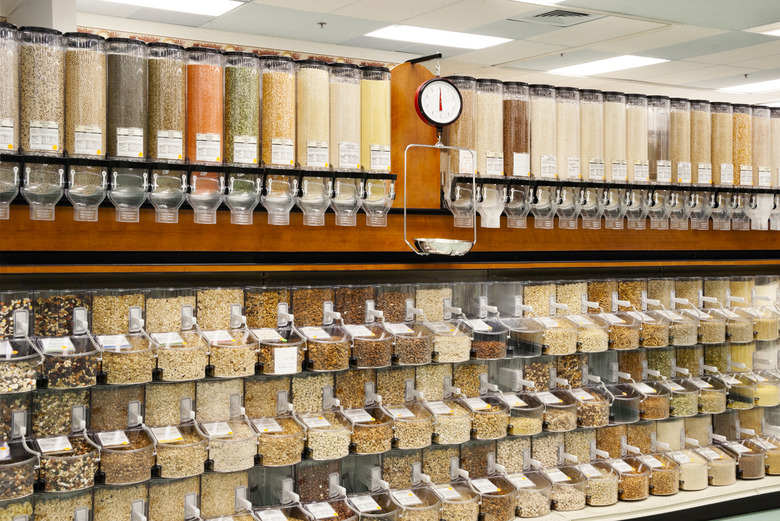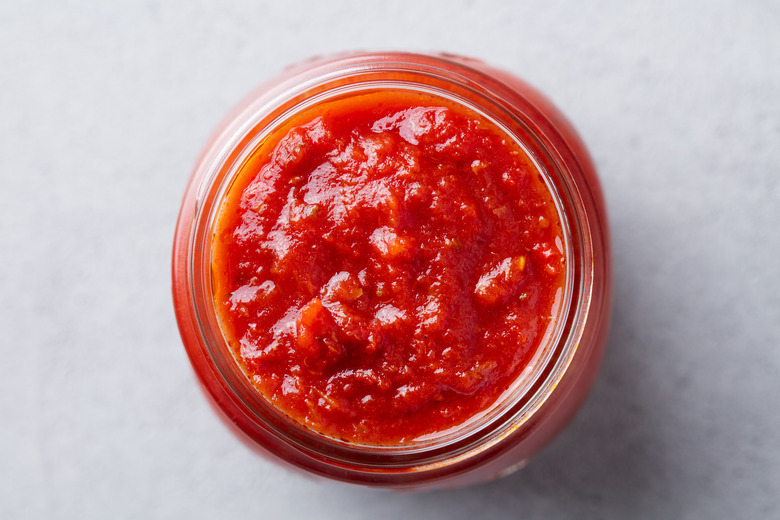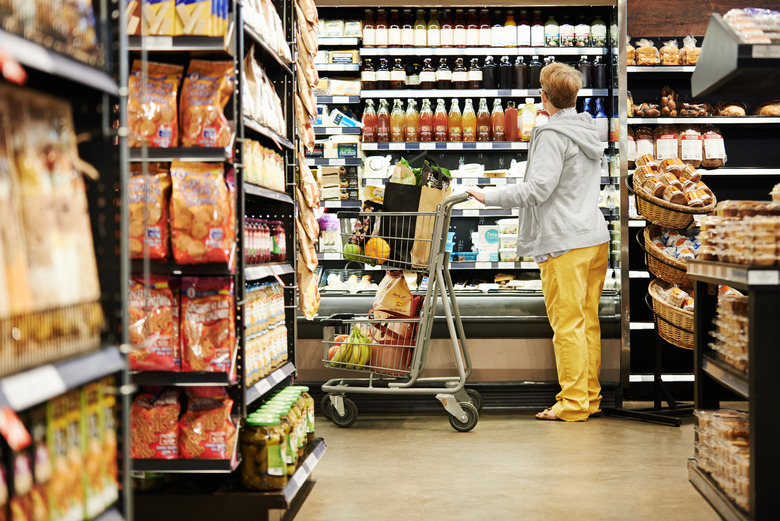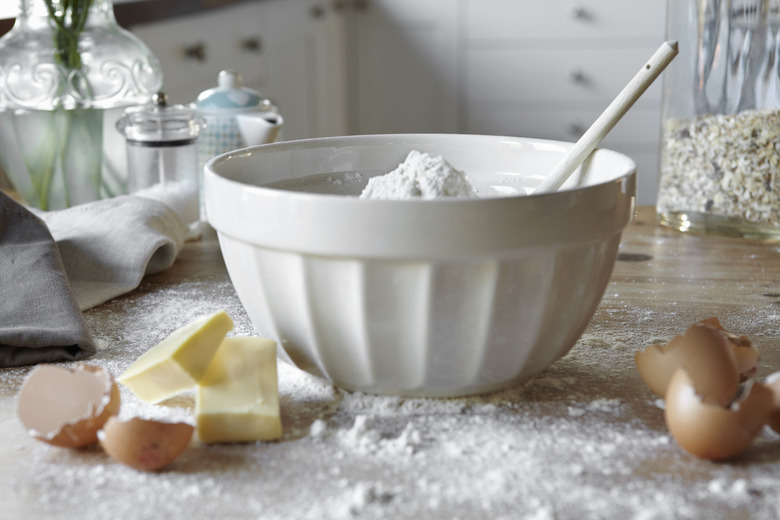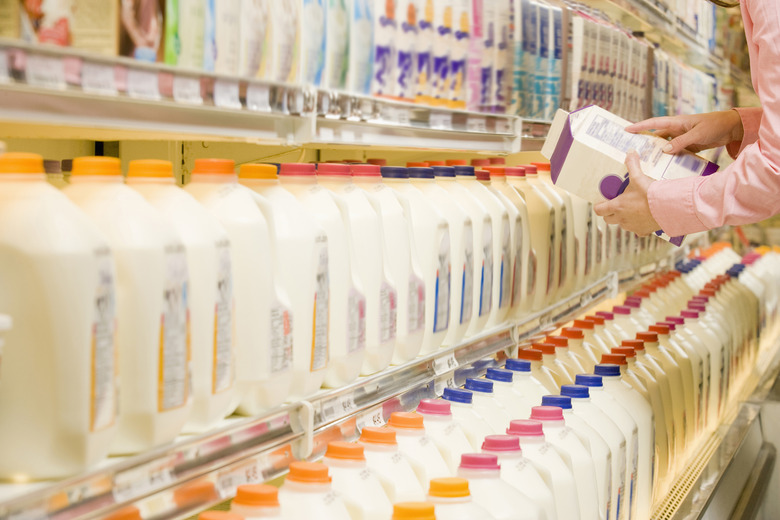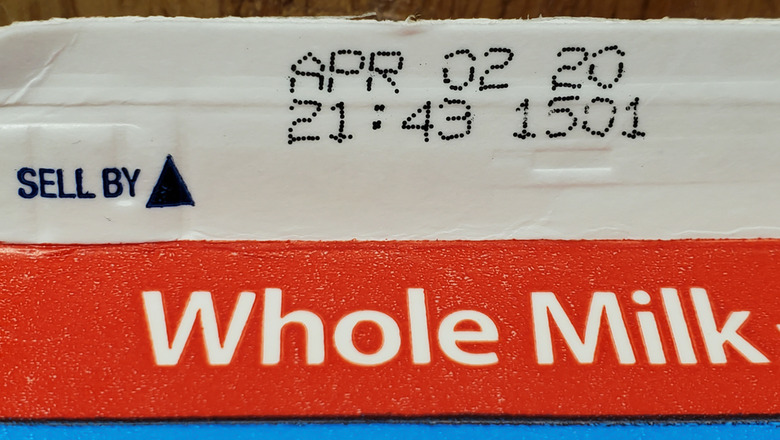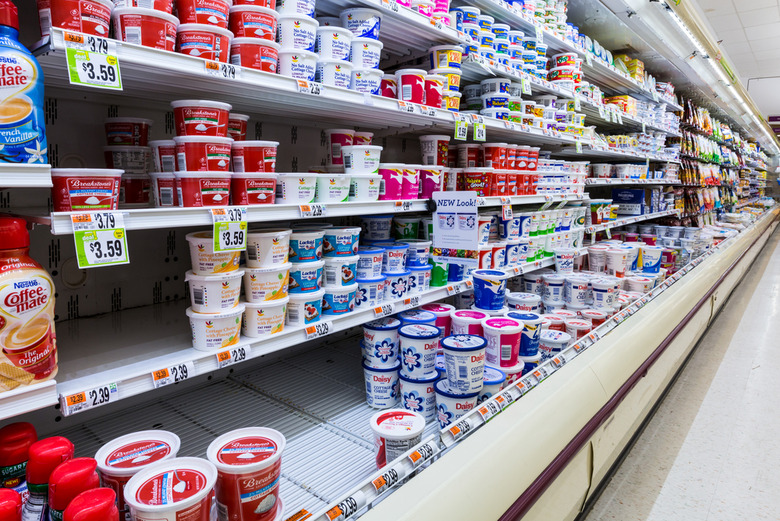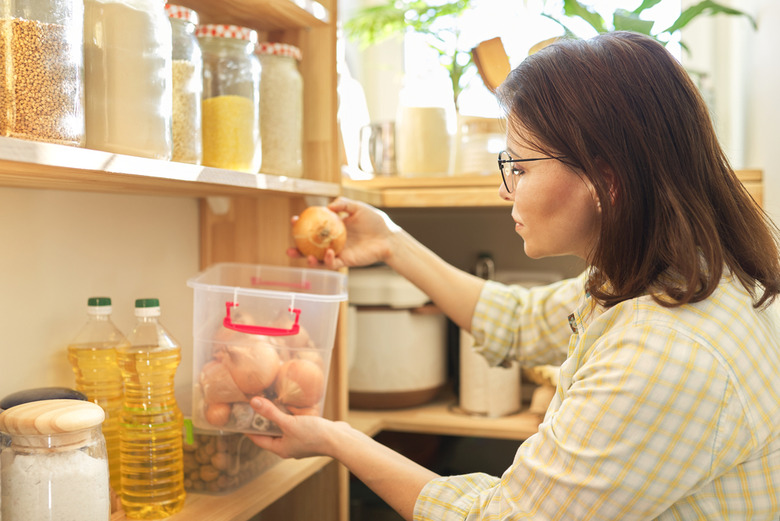Coronavirus Grocery Shopping Tips For Making The Most Of Your Trip
Although most people are staying home, it's still necessary to leave the house every once in a while to get essential supplies like medicine and groceries, especially if online grocery delivery isn't available in your area. While it's important to remember social distancing practices and properly wear a face mask in public, it's also smart to try and make the most out of your grocery trip. To get you started, we put together some tips that might help.
Take inventory of what you already have in stock
Before you head out to your essential grocery store trip, go "shopping" in your fridge, pantry and freezer. Try to build meals based on what you find, and jot down things you need to get more of. And while you're at it, discard anything that's expired to make room for new groceries.
Make a grocery list
After you go through what you already have, make a grocery list, and a pretty extensive one at that so you don't have to make another trip to grab the forgotten jar of peanut butter. Write the list in these categories: dairy, produce, pantry staples, meat and other non-food related things you might need.
List and shop in meals
As you create your grocery list, build your weekly menu of breakfasts, lunches and dinners and shop for those meals. To optimize your time and budget, try to craft recipes for the week that have similar ingredients. If you're buying some ground turkey for sloppy joes, buy the meat in a family-size pack and use half for the sandwiches and half for turkey meatballs later in the week.
Shop by aisles
If you regularly shop at the same stores, organize your shopping trip and list by aisles so that you can easily find and check off items as you walk down each one. Try to shop from right to left so you're not running back and forth in the store and bumping into people.
Get fresh whole produce
Pre-packaged and pre-cut fruits and vegetables are generally more expensive than whole produce and are way less eco-friendly with all that extra plastic packaging. And because the produce is pre-cut, it's not as fresh as whole melons or apples and will spoil faster. You should be focusing on items that will last the longest.
Buy the store brand
You'll also want to save money where you can, so going for the generic items that tend to be cheaper than most brand names is a smart move. And some groceries are just as good or better when you buy generic. Generic or store brands are generally cheaper than national-brand items because the retailer can optimize the production to suit consumer demand and reduce advertising costs. It's a misconception that price is indicative of the quality. In some cases, the packaging is the only thing differentiating two items and making the one cheaper than the other.
Look for shortcuts
There's absolutely nothing wrong with taking a shortcut or two when planning meals. Rotisserie chicken is the classic grocery store prepared food, and Costco's chicken will run you only $5. You can make tons of things with rotisserie chicken, from Tex-Mex chicken tortilla soup to chicken pot pie.
Embrace frozen food
While some frozen foods are healthier than others, when you're in the frozen foods aisle, grab some shortcut ingredients. For instance, having some frozen pizza crusts on hand makes getting dinner on the table considerably easier — just spread some sauce, shred some cheese, add a few veggies on top and pop it in the oven.
Buy frozen veggies
Frozen vegetables are one of the best foods to stock up on and are a great meal-prepping hack. If your grocery store has enough to go around, buy frozen peas, broccoli, cauliflower, green beans and corn that can be made into a number of versatile dishes. Just make sure you know how long frozen veggies and other foods last in the freezer.
Get frozen fruits
Just like frozen veggies, frozen fruits are convenient, thrifty and excellent for simple desserts, easy breakfast dishes and more. By having a stash of frozen berries or tropical fruits in the freezer, you can make smoothies and get your vitamin fix without having to sprint through your produce.
Buy staples in bulk
Not only does buying in bulk usually cost less than buying items in smaller sizes, but it also prevents you from making more frequent trips to the store. Of course, be mindful of other shoppers and don't take more than you need for a few weeks. Some good things to buy in bigger packages during coronavirus quarantine are flour, grains, meat and canned soups and beans to make some simple recipes.
Load up on pasta and jarred sauce
Boxes of dried pasta are quarantine MVPs when it comes to easy weeknight dinner dishes. Grab a few boxes and jarred sauces. You can stretch a jar of marinara by using it for two meals — use half the jar for spaghetti sauce and save the rest for mini pizzas or flatbread.
Grab perishable items from the back of the shelf
Grocery stores stock the freshest items in the back, so it's a good idea to reach back to grab that coffee creamer or that head of lettuce. Also, the items in the front are more likely to have been touched by others.
Know your ingredient swaps
If your grocery store is out of all-purpose flour, angel hair pasta or the particular spice you need, it's important to know how to think on your feet. For instance, a tablespoon of cornstarch can be swapped for 2 tablespoons of flour. Read up on these other handy ingredient swaps before shopping.
Understand the difference between food safety dates
Knowing what the "sell by" and "best by" dates mean is incredibly important when buying groceries for an extended period of time. Make sure you have all your grocery store questions answered before venturing out.
What does ‘sell by’ mean?
The "sell by" date is aimed at retailers, not necessarily consumers. It lets grocery stores know the date by which the product should be sold or removed from the shelf. This does not mean that the product is unsafe after the date listed.
What about ‘best if used by?’
According to the Food and Drug Administration, the "best if used by" date indicates the date when a product will be at its best flavor and quality — it is not the expiration date. Some products like heavy cream or cottage cheese have an expiration date but also have a label that reads something like "best if used within seven days of opening." While shopping, and especially when it comes time to use certain dairy products, think of more than one way to use the item while it's still at its freshest. Knowing what certain labels mean is especially important when making recipes that use a lot of milk.
Know how to store your groceries
A lot of people put onions in the fridge, but that produce is best kept in a cool, dry place, like the pantry. Part of making the most of your grocery trip is making the most of your groceries by cooking them correctly and knowing how to store them properly.
More from The Daily Meal:
Can Coronavirus Spread Through Food? And Other Covid-19 Food Questions, Answered
Easy, Fun Recipes to Make At Home With Kids During Coronavirus Quarantine
How to Thaw Chicken and Other Defrosting Food Questions, Answered
Are Nonstick Pans Safe? And Other Kitchen Tool Questions, Answered

